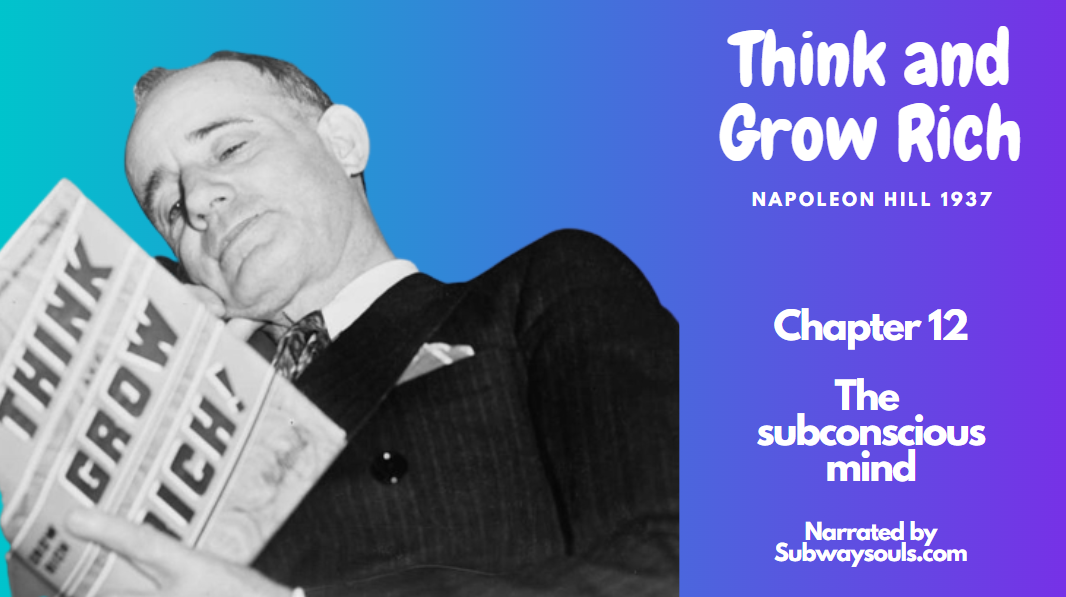Chapter 12 of “Think and Grow Rich” by Napoleon Hill is titled “The Subconscious Mind: The Connecting Link.” This chapter explores the power and workings of the subconscious mind and its role in achieving success. Here is a summary of the key points covered in this chapter:
1. Understanding the subconscious mind: Hill explains that the subconscious mind is the bridge between the conscious mind and the infinite intelligence of the universe. It is the repository of all thoughts, beliefs, memories, and experiences.
2. The power of autosuggestion: Hill highlights the importance of using autosuggestion to program the subconscious mind with positive and empowering beliefs. By consistently feeding the subconscious mind with thoughts of success, abundance, and achievement, individuals can influence their behaviour, actions, and outcomes.
3. Reprogramming negative beliefs: Hill emphasizes the need to eliminate negative beliefs and thought patterns that hinder success. By consciously replacing negative thoughts with positive affirmations and visualizations, individuals can reprogram their subconscious mind and attract positive experiences.
4. The subconscious mind and creative imagination: Hill explores the connection between the subconscious mind and creative imagination. Through the subconscious mind, individuals can tap into their creative faculties and generate innovative ideas and solutions.
5. The role of emotions in programming the subconscious mind: Hill explains that emotions are powerful tools for influencing the subconscious mind. By infusing positive emotions like faith, love, and enthusiasm into thoughts and affirmations, individuals can strengthen the impact on the subconscious mind.
6. Building a harmonious relationship between the conscious and subconscious mind: Hill emphasizes the importance of aligning the conscious and subconscious minds. By maintaining a harmonious relationship and eliminating conflicts, individuals can harness the full power of the subconscious mind to achieve their goals.
7. The power of dreams and intuition: Hill highlights that the subconscious mind communicates through dreams and intuitive insights. By paying attention to dreams and trusting one’s intuition, individuals can tap into the guidance and wisdom of the subconscious mind.
8. Persistence and the subconscious mind: Hill emphasizes that persistence is key in influencing the subconscious mind. By consistently repeating positive affirmations, visualizations, and taking persistent action towards goals, individuals can embed their desires deeply into the subconscious mind.
9. The importance of relaxation and silence: Hill recommends regular periods of relaxation and silence to allow the subconscious mind to work effectively. By quieting the conscious mind through relaxation techniques, individuals create a conducive environment for the subconscious mind to provide insights and solutions.
In summary, Chapter 12 of “Think and Grow Rich” explores the power and influence of the subconscious mind in achieving success. It highlights the role of autosuggestion, positive affirmations, and visualizations in programming the subconscious mind. The chapter emphasizes the importance of eliminating negative beliefs, aligning the conscious and subconscious minds, and utilizing emotions to enhance subconscious programming. By understanding and harnessing the power of the subconscious mind, individuals can tap into their creative faculties, attract abundance, and achieve their goals.
NB: The above is one chapter from the book “Think and Grow Rich” written by Napoleon Hill and first published in 1937.
It is considered one of the most influential self-help books ever written and has sold millions of copies worldwide. The book aims to inspire readers to achieve success in their personal and professional lives by adopting a mindset of wealth and abundance.
The central theme of “Think and Grow Rich” is that success begins with one’s thoughts and beliefs. Napoleon Hill presents a philosophy of success based on the idea that our thoughts can directly influence our actions and ultimately shape our reality. He argues that by developing a burning desire for a specific goal and aligning one’s thoughts, beliefs, and actions with that desire, individuals can overcome challenges and achieve extraordinary success.
Throughout the book, Napoleon Hill shares principles and strategies for achieving success. These include:
1. The power of thought: Hill emphasizes the importance of maintaining a positive mental attitude, visualizing success, and having a clear and definite purpose.
2. Goal setting: He encourages readers to set specific, measurable, achievable, relevant, and time-bound goals (often referred to as SMART goals) and to create a detailed plan for their attainment.
3. Persistence: Hill emphasizes the need for persistence in the face of challenges, setbacks, and failures. He suggests that persistence is a key trait shared by successful individuals.
4. Mastermind groups: Hill emphasizes the importance of surrounding oneself with like-minded individuals who share similar goals and aspirations. He believes that collaborating and exchanging ideas with such a group can lead to greater success.
5. The subconscious mind: Hill explores the power of the subconscious mind and suggests techniques for programming it to support success. He introduces the concept of autosuggestion, which involves repeating positive affirmations and beliefs to reprogram the subconscious mind.
6. The importance of action: Hill emphasizes the need to take consistent and decisive action towards one’s goals. He argues that thoughts alone are not enough; they must be accompanied by action.
“Think and Grow Rich” also features numerous anecdotes and success stories from notable figures such as Thomas Edison, Henry Ford, Andrew Carnegie, and many others. These stories serve to illustrate the principles discussed in the book and provide inspiration and motivation for readers.
Overall, “Think and Grow Rich” presents a philosophy of success that focuses on the power of thoughts, beliefs, and actions. It provides practical strategies and principles that individuals can apply to achieve their goals and attain wealth, not just in terms of money but also in terms of personal fulfilment and happiness.

